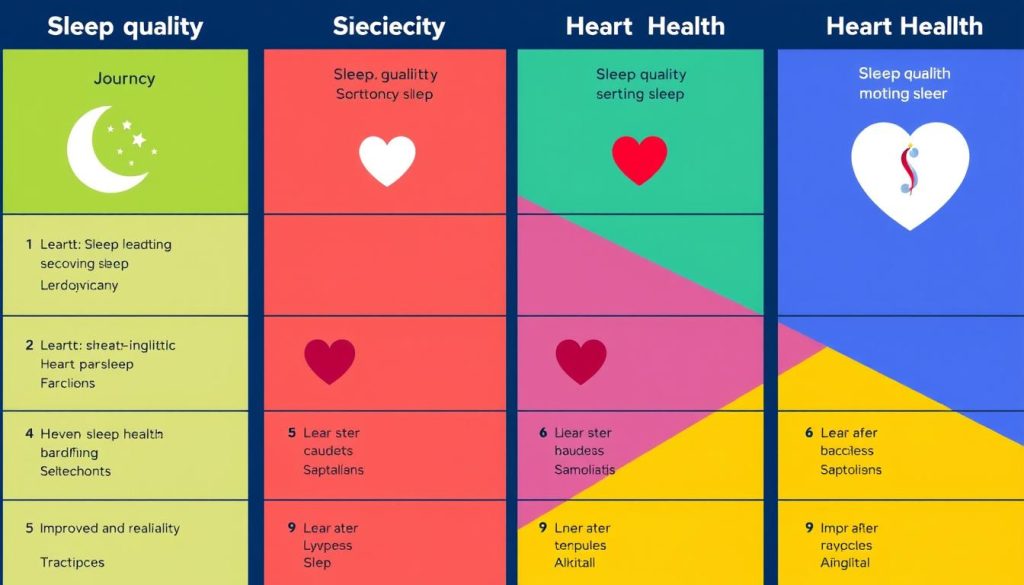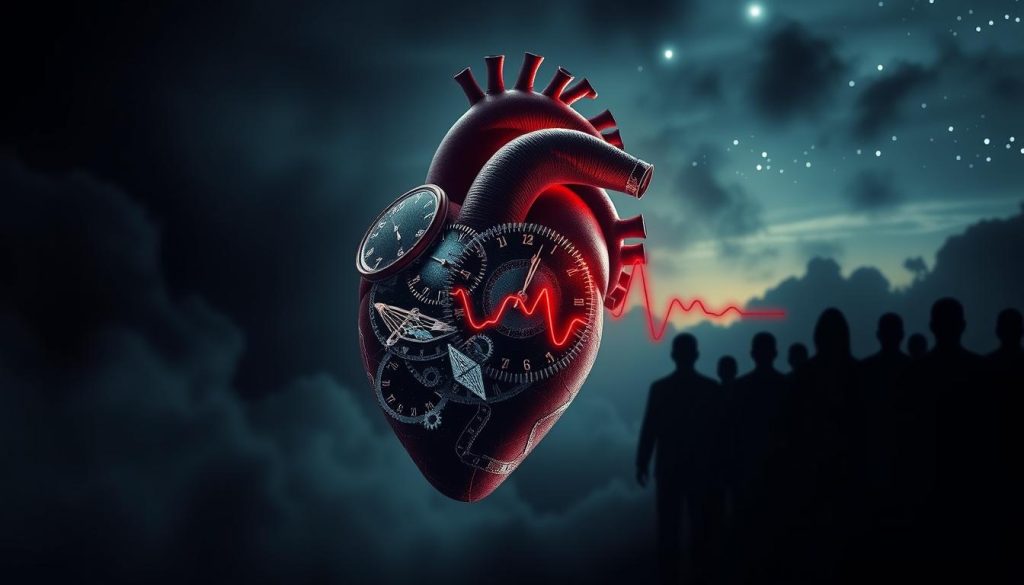The human body has a biological clock called the circadian rhythm. It controls important processes like sleep quality, hormone release, and heart health. Knowing about this cycle helps me make better choices for my cardiovascular health.
In this article, I’ll look at how circadian rhythms affect heart function. I’ll show how staying in tune with natural light and body signals can help. This knowledge can lead to better heart health through lifestyle and stress management.
Understanding Circadian Rhythm
Circadian rhythms are key parts of my body’s internal clock. They control many processes over a 24-hour cycle. This includes my sleep-wake cycle, hormone release, and metabolism. Let’s dive into what circadian rhythm means and the science behind it.
What is Circadian Rhythm?
The term “circadian rhythm” comes from Latin. It means “around” and “day.” This internal clock controls when I feel sleepy or alert. It’s influenced by external cues like sunlight.
Understanding these cycles shows why a regular routine is important. It helps keep my biological clock in sync.
The Science Behind Circadian Rhythms
The study of circadian rhythms involves hormones. Melatonin, for example, is released in darkness. It makes me feel sleepy and helps regulate my sleep-wake cycle.
This ancient connection between behavior and environment supports health. Keeping a regular sleep schedule boosts my biological clock’s function. This improves my health and wellness.
The Connection Between Sleep and Heart Health
It’s important to understand how sleep affects heart health. My sleep habits greatly impact my heart’s function. Good sleep helps my body recover and keeps my heart healthy. On the other hand, bad sleep can lead to health problems.
How Sleep Quality Affects Cardiovascular Health
Sleep quality is key to keeping my heart healthy. Bad sleep can raise my blood pressure and stress levels. This can lead to heart disease. Deep sleep is especially important for hormone regulation and heart function.
Signs of Poor Sleep and Its Impact on My Heart
Knowing the signs of poor sleep helps me protect my heart. Common signs include:
- Excessive daytime fatigue
- Poor concentration
- Irritability
These symptoms may point to sleep disorders that harm my heart. Spotting these signs is crucial for keeping my heart safe through good sleep.

| Sign of Poor Sleep | Potential Impact on Heart Health |
|---|---|
| Excessive Daytime Fatigue | Increased risk of hypertension |
| Poor Concentration | Reduced ability to manage stress |
| Irritability | Potential for unhealthy coping mechanisms |
Circadian Rhythm and Cardiovascular Health
The link between our body’s natural rhythm and heart health is becoming clearer. Irregular sleep or too much screen time before bed can harm our hearts. Studies show that living in sync with our natural rhythms can boost heart health.
Research Linking Circadian Disruption to Heart Disease
Research shows that out-of-sync body rhythms can hurt our heart. A study in “Circulation” found that irregular sleep increases heart disease risk. Working nights or using screens late at night raises this risk even more.
Our body’s inflammation and hormone balance can get messed up. This can lead to heart problems over time.
Preventive Measures for Better Heart Health
Making simple changes can help protect our hearts from rhythm disruptions. Here are some ways to improve our heart health:
- Stick to a regular sleep schedule to match our natural rhythms.
- Make our sleep area calm and free from screens.
- Try relaxation methods before bed to help sleep.
- Stay away from big meals and caffeine or nicotine at night.

How Lifestyle Choices Affect My Circadian Rhythm
My daily choices greatly affect my circadian rhythm. It’s key to know how diet and exercise impact my body’s clock. This part talks about how eating right and exercising at the right time help me stay healthy.
The Role of Diet in Regulating Circadian Rhythm
Eating a balanced diet is crucial for my circadian rhythm. Foods like fruits, veggies, whole grains, and healthy fats are essential. They not only give me nutrients but also help me eat at the right times. Here’s a quick guide to good eating habits:
- Eat colorful veggies for antioxidants and vitamins.
- Choose whole grains for lasting energy.
- Add healthy fats from avocados and nuts.
- Avoid big meals at night to keep sleep undisturbed.
Exercise Timing for Optimal Health Benefits
Regular exercise also shapes my circadian rhythm. The right time for workouts can boost my heart health. Studies show that exercising at certain times improves performance and recovery, keeping my body in sync. Here are some tips on when to exercise:
- Mornings: Early workouts boost alertness and set a good day tone.
- Afternoons: This is when I’m strongest, perfect for weight training.
- Evenings: Light exercise is best to avoid sleep issues.

By choosing wisely, I support my circadian rhythm and improve my health. A healthy diet and smart exercise times lead to better habits.
The Effects of Stress on Circadian Rhythms
I’ve learned that stress can really mess with my sleep and heart health. When I’m stressed, my body makes more cortisol and other hormones. This can make it hard to sleep and can harm my heart. Spotting stress symptoms early is key to staying healthy.
Coping Mechanisms for Managing Day-to-Day Stress
Dealing with life’s stressors has taught me a lot. Deep breathing exercises help me calm down fast. Talking to friends also helps, as it brings comfort during hard times. These methods help me handle daily stress better, which is good for my heart.
Mindfulness and Its Role in Circadian Alignment
Mindfulness is now a big part of my life. It helps me stay in sync with my body’s natural rhythms. Through meditation and mindfulness, I find peace and better sleep. This approach to stress management is crucial for my health.

